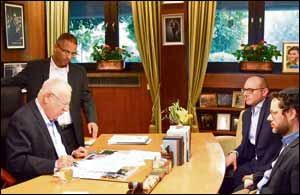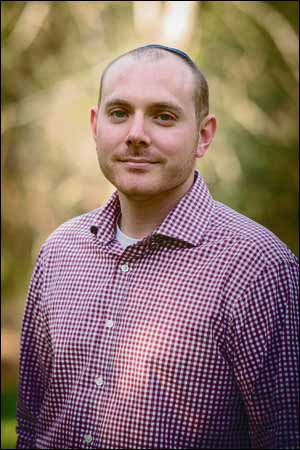|
PROFILE Jason leaves role with the president for think-tank | ||
LIFE is hard for fans of the Championship’s bottom side Sunderland.
The club’s downfall, which began around five years ago, coincided with fan Jason Pearlman’s time as the international media adviser to Israeli president Reuven Rivlin. And the club had sunk so low after relegation from the Premier League that the 35-year-old had to leave his job in the hope it would improve their form. But, it hasn’t. Since Jason was appointed deputy director of think-tank the Henry Jackson Society last week, Sunderland have drawn 1-1 with Millwall and, on Tuesday, lost 3-0 to Aston Villa, at the Stadium of Light. The father-of-three told me: “I said to my wife Yael that I had to get out of there because otherwise we would be b*****ed. But it really doesn’t seem to have helped! “I’m a bit despondent about them.” Two years ago, Jason took his children to Sunderland to visit the synagogue, which is standing idle and in need of repair. “We also went to the cemetery to see their grandparents’ graves, their great-great grandparents’ graves and their great-great-great grandmother’s grave,” Jason said. “I showed them their roots and the importance of Sunderland as a community, and what the Jewish community contributes to the UK. “I am very proud to be from Sunderland. If it’s not Israel, it’s Sunderland.” Jason had a modern Orthodox upbringing, attending cheder and Sunderland Kollel. He was educated at Newcastle Royal Grammar School, before his family moved to London when he was 16. There, he attended Immanuel College and then Brunel University, where he read politics and social policy. But it was in between those two educational experiences that he really found his love of politics, thanks to a gap year in Israel with Bnei Akiva. Jason’s gap year coincided with the second intifada and was a time where, as he puts it, you couldn’t escape politics. He recalled: “There was an election going on at the time, as well. “That period really shaped my attitude to politics and made me want to be politically active. “I was always going to study politics. It changed my academic and theoretical interest into a practical interest.” Jason’s first communal role was as media director of the Board of Deputies in 2004. Despite growing up outside of the “usual” mainstream Jewish communities, he was always aware of the issues that meant the most to them. He said: “I always felt drawn towards the opportunity of representing the issues I knew and cared deeply about, as well as the values of the world I had grown up in. “The three main issues we dealt with were the Ken Livingstone and Oli Feingold saga (where Livingstone compared Jewish journalist Finegold to a ‘ German war criminal’); the first academic boycott, where we saw the emergence of radicalisation on campus; and the launch of international Holocaust Memorial Day.” Jason then took his first foray into the world of Israeli politics when, in 2005, he took up a post at the Israeli embassy’s department of public affairs. But it was his role post-embassy which really proved pivotal in his career trajectory. From 2007-2010, he became foreign press liaison for Israel’s government press office, dealing with major news organisations such as the BBC, CNN and Sky News. He said: “Moving into press and the media world was a by-product of the timing of when I started my career. “The centrality of the emergence of media online was massive and pushed my career down that path. “It was my job to ensure that the media had free access in Israel and good relations and communications support to operate safely and securely. “It was vital for democracy and the public awareness of the issues surrounding the country at the time.”
He said: “There is a great importance in not having an antagonistic relationship. “Criticism of Israel is not just in the foreign press, it’s also in Israeli media — but the difference in the Israeli media is that one page will be critical while the next will highlight Israel’s work in Syria or in disadvantaged neighbourhoods. “Overall, however, the situation has improved. Israel is now understood by those in the region and in the media to be part of the solution, not the problem. “It also helps that the country got better at dealing with international media.” Jason would then move on to a role which he now calls his “dream” job — working alongside president Rivlin — a position he held until last month. Rivlin, it turns out, is a Liverpool fan and was the lawyer involved in taking Israeli international Avi Cohen to Anfield in the late 1970s. Jason recalled: “He’s a huge football fan. He has some of the funniest stories, such as the time he went to watch Chelsea play Leeds and the latter were losing 4-0. “He asked one of the Leeds fans why they were still chanting in the 90th minute and was told that ‘this is Leeds United, anything can happen’. “I asked him what happened, he laughed and said ‘they still lost’.” Working in such a high-powered position gave Jason the chance to meet iconic figures such as Donald Trump, Prince Charles and Ban Ki Moon. But, he was quick to add, none of those are his top highlight. He said: “The highlights were being out on the road in Israel and going to visit Israeli Arabs, religious Jews, secular Jews, Christians and communities from across the spectrum and to see the president interact with the people of Israel. “You don’t see the real fabric of Israeli society in the media, and I got the opportunity to see a varied society function as a Western democracy — it was a fantastic experience. “The real experience came from seeing society up close. It changed my opinion of it so much, while also reinforcing my beliefs and understanding. “I had so often talked about Israel being a Jewish democracy, with no contradiction between its values as a Jewish state and being a democracy, which I then got to see. “For Europe, and the rest of the world, the idea of all these communities living together and sharing the common future of a country is Israel’s next opportunity to be a light unto the nations. “We’ve taught the world how to drain the swamps, how to build solar panels and make self-driving cars, but now we need to show the world how we live together.” Jason’s role was about getting that message out. He said: “You are talking to international media, politicians and opinion leaders who have a very specific perception of Israel. “Suddenly, they are opened up to the reality. “There are several instances of journalists who were looking at the issues of racism in Israel, and their headlines went from being ‘Israel has a problem with racism’ to ‘Israel is dealing with racism thanks to these societies living together’. “That was a really important message, because there are problems — but it’s time we talk about the solutions, not the problems. It’s not easy.” Jason left his home in Modi’in to take up his role as the deputy director of the Westminster-based think-tank, the Henry Jackson Society. He said: “It really is a tremendous honour and an exciting challenge. “Throughout my previous roles, the Henry Jackson Society has been a first port of call for information and research on a wide range of topics. “The chance to contribute to this important work is a true privilege. “If I look back at my career so far, the importance of media as an arm of democracy is something I will bring with me. “That extends across the board, in so many issues such as counter-radicalisation and understanding policy in Russia, Europe and Asia — nothing exists in a vacuum. “The importance of the work of the Henry Jackson Society in defending and promoting our values is the challenge of our generation.”
|
 DREAM JOB: Jason Pearlman, second right, with President Reuven Rivlin, President’s office director General Harel Tubi and senior advisor Chaim Neria
DREAM JOB: Jason Pearlman, second right, with President Reuven Rivlin, President’s office director General Harel Tubi and senior advisor Chaim Neria